9 Essential Elements of an Emotional Support Dog Letter Template
by Lena Park
Last updated: September 7, 2025
Verified and Approved by:
Angela Morris,
MSW, LCSW
Fact Checked

Overview
This article highlights the essential components of an emotional support dog letter template, showcasing its significance for individuals seeking legal recognition and benefits from having an emotional support animal. It compassionately outlines the key elements that must be included in the letter, such as the client’s mental health condition and the endorsement from a licensed professional. This ensures compliance with legal standards, facilitating housing and travel arrangements for those who need it most.
For many individuals facing mental health challenges, the journey can often feel overwhelming and isolating. An emotional support animal can provide comfort and companionship, helping to ease the burden of daily struggles. The letter serves as a vital tool in accessing these benefits, offering reassurance and support.
By including the necessary details in the letter, individuals can better navigate the complexities of housing and travel, allowing them to focus on their well-being. It’s important to remember that support is available, and taking this step can lead to a more fulfilling life with the help of an emotional support animal.
Introduction
Understanding the profound impact of emotional support animals (ESAs) on mental health is essential for those navigating the complexities of emotional challenges. Many individuals face daily struggles that can feel overwhelming, and the presence of a beloved companion can make a significant difference.
As these cherished animals provide comfort and companionship, the importance of a well-crafted emotional support dog letter template becomes increasingly significant. This article delves into the critical elements that make up an effective ESA letter, exploring how these documents not only validate the necessity of an emotional support animal but also offer essential legal protections for their owners.
What are the key components that ensure an ESA letter is recognized and accepted?
How can individuals effectively advocate for their rights in housing and travel situations?
Together, we can explore these questions and find reassurance in the support available.
Wellness Wag: Comprehensive ESA Letter Services for Emotional Support Dogs
At Wellness Wag, we understand the emotional challenges that individuals with mental health issues often face. The journey can be overwhelming, filled with uncertainty and a longing for support. That’s why we specialize in providing an emotional support dog letter template, ensuring that our clients receive valid paperwork that meets all legal requirements.
Our efficient procedure begins with a brief evaluation, where we take the time to comprehend your personal assistance needs. This initial step is followed by meetings with certified healthcare providers who are dedicated to understanding your unique situation. This personalized approach allows for a thorough evaluation of your eligibility for an ESA, ensuring that you receive the support you truly deserve.
Once you complete your consultation, you can expect a professionally crafted emotional support dog letter template, which is recognized legally, to be issued within just 24 hours. This letter is more than just a document; it is a key that opens doors to housing and travel arrangements with your therapy dog, providing you with the comfort and companionship you need.
Our extensive service is designed to assist individuals encountering mental health issues, facilitating a smoother path towards healing and stability. We are here to support you every step of the way, ensuring that you feel cared for and understood. Remember, you are not alone on this journey; we are here to help you find the support you need.
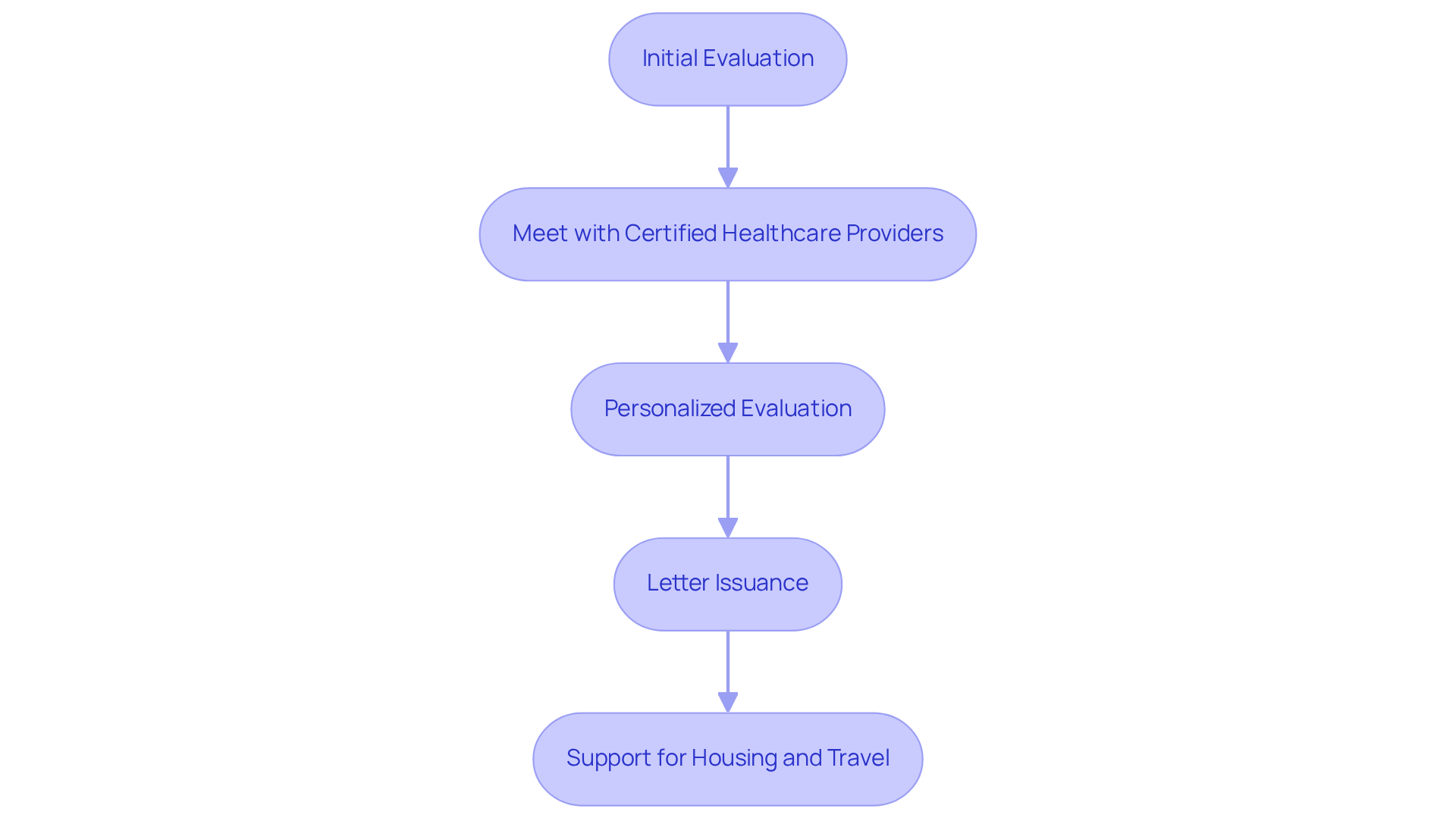
Definition of an Emotional Support Dog: Understanding the Role and Benefits
For individuals grappling with psychological challenges, therapy dogs serve as invaluable companions. While service dogs undergo specialized training, emotional support animals (ESAs) provide comfort and reassurance simply through their presence. Many people may not realize that research shows these animals can significantly ease symptoms of anxiety, depression, and PTSD, promoting a sense of mental well-being and companionship. In fact, a remarkable 86% of pet owners believe their pets positively impact their mental health, with therapy dogs playing a crucial role in reducing feelings of isolation and loneliness.
The bond shared between humans and their pets can lead to tangible improvements in mental health. Interactions with ESAs are linked to lower cortisol levels and higher oxytocin levels, hormones that contribute to stress relief and bonding. Furthermore, obtaining an emotional support dog letter template from Wellness Wag provides individuals with legal protections under the Fair Housing Act, enabling them to live with their emotional support animals in housing that typically restricts pets. This is especially beneficial for working professionals who are striving for a healthier work-life balance amidst stress.
Wellness Wag ensures a smooth online process for acquiring valid ESA documents by providing an emotional support dog letter template through expert consultations and client education, making it easier for individuals to access the support they need. Additionally, if for any reason your ESA document does not work, Wellness Wag offers a Money Back Guarantee, providing peace of mind to clients.
As awareness of the benefits of emotional support animals continues to expand, they are increasingly recognized as vital components of mental health treatment. They complement traditional therapies and enhance the quality of life for many individuals. Have you considered how an ESA might help you or someone you care about? The journey towards better mental health can be supported by the loving presence of an emotional support animal.
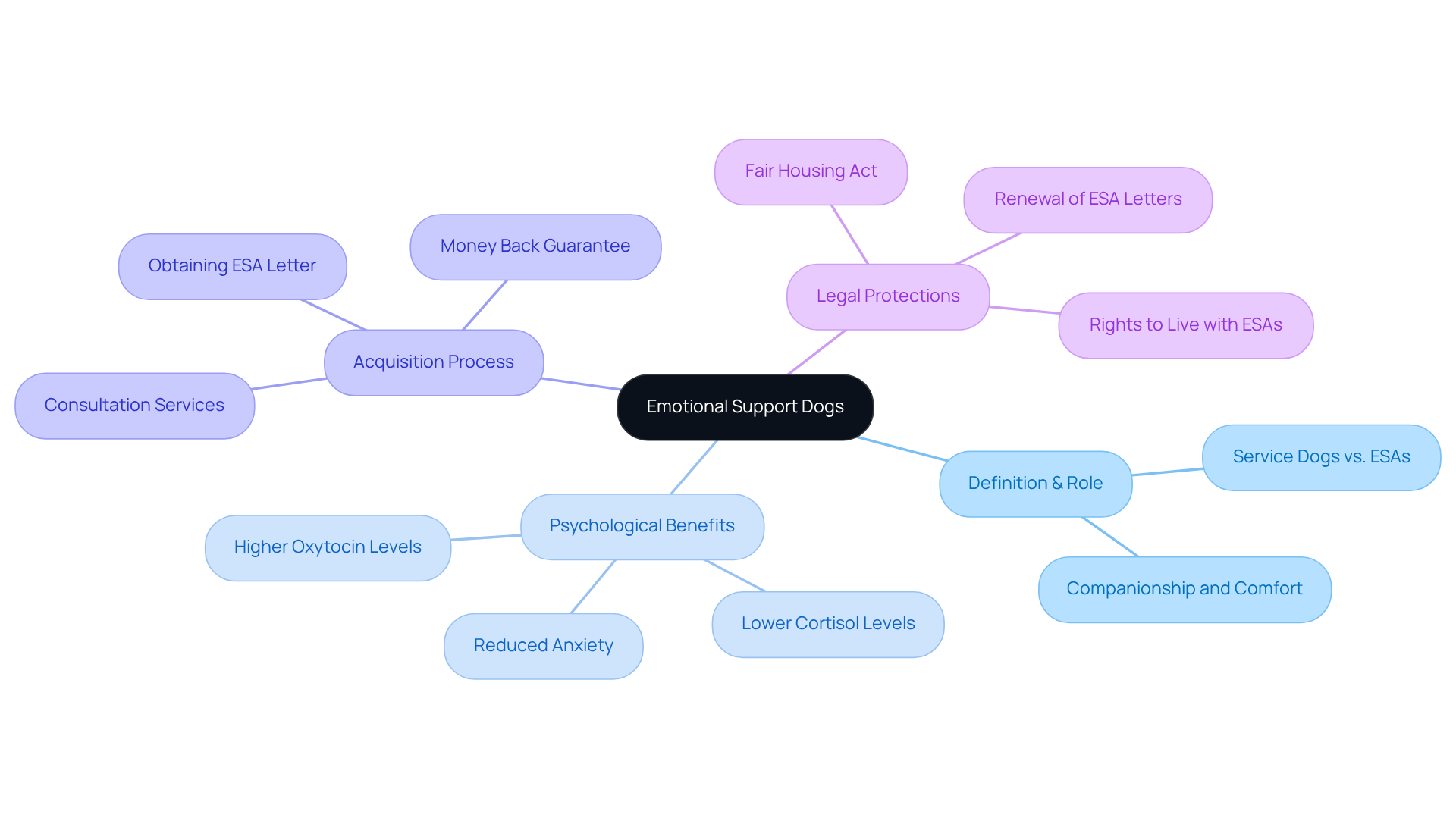
Key Components of an ESA Letter: Essential Elements to Include
An effective emotional support dog letter template must encompass several key components to ensure it is accepted by landlords and airlines. These essential elements include:
- Client’s Name: Clearly state the name of the individual requiring the ESA, as this personal touch is vital in acknowledging their unique journey.
- Licensed Professional’s Details: Include the name, credentials, and contact information of the licensed mental health professional (LMHP) providing the document, ensuring a trusted source of support.
- Statement of Mental Health Condition: Offer a brief description of the client’s mental health condition, confirming that it qualifies as a disability under the DSM-5 criteria, validating their experiences and struggles.
- Recommendation for an Emotional Support Dog: Clearly articulate the necessity of the emotional support dog in alleviating the client’s symptoms, emphasizing the profound impact these animals can have on emotional well-being.
- Professional’s Signature and License Number: The document must be signed by the LMHP and include their license number to validate its authenticity, reinforcing the importance of professional endorsement.
These components are crucial for ensuring that the emotional support dog letter template complies with legal standards and is recognized under the Fair Housing Act (FHA) and the Air Carrier Access Act (ACAA). Additionally, for travel with Air Canada, it is important to note that emotional support animals are no longer recognized, and only psychiatric service dogs can travel with proper documentation. This includes completing a U.S. DOT form and notifying the Medical Assistance Desk 48 hours before the flight. A PSD document is recommended for smooth check-in. ESA documents are generally valid for one year from the date of issuance, highlighting the necessity for prompt updates. Furthermore, landlords must offer reasonable accommodations for individuals with valid ESA documentation, even in properties with ‘no pets’ policies. This legal support emphasizes the significance of possessing a well-structured emotional support dog letter template to facilitate housing and travel arrangements, ensuring that individuals feel supported and understood throughout their journey.
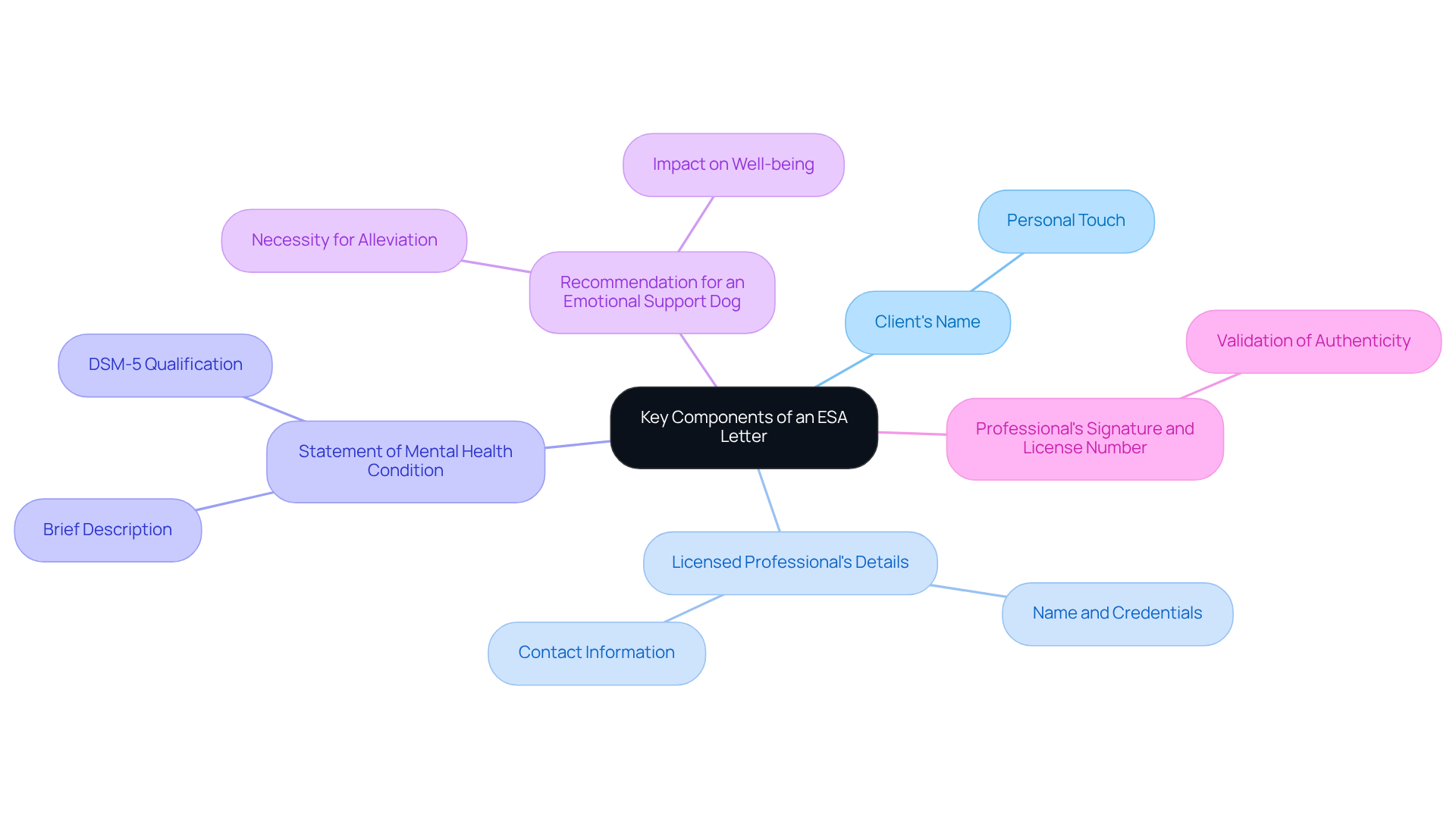
Licensed Professional Requirement: Why You Need a Qualified Therapist
Obtaining a valid ESA document is a crucial step for those navigating the emotional challenges of mental health issues. Consulting a licensed mental health professional is essential in this process, as it ensures that your unique mental health needs are assessed by a qualified expert who can make informed determinations. Licensed therapists play a pivotal role in providing the necessary documentation, including an emotional support dog letter template, that substantiates the need for an emotional support dog, a vital aspect for legal recognition.
Their assessments must adhere to established guidelines, ensuring that the emotional support dog letter template includes specific details such as:
- Your mental health condition
- The therapeutic relationship with your animal
- The professional’s credentials
- Your name and address for clarity
Moreover, the ESA document should be composed on the provider’s official stationary to guarantee its authenticity. This thorough approach not only enhances the validity of the ESA document but also protects your rights when seeking accommodations under the Fair Housing Act and Air Carrier Access Act.
It’s important to be aware that obtaining an ESA letter fraudulently can lead to denied accommodations or legal repercussions, which can add to your stress. Therefore, finding a qualified therapist who specializes in mental health evaluations related to assistance animals is crucial. This ensures that the documentation meets all legal criteria and adequately addresses your needs. Remember, you are not alone in this journey; support is available to help you find the peace and comfort you deserve.
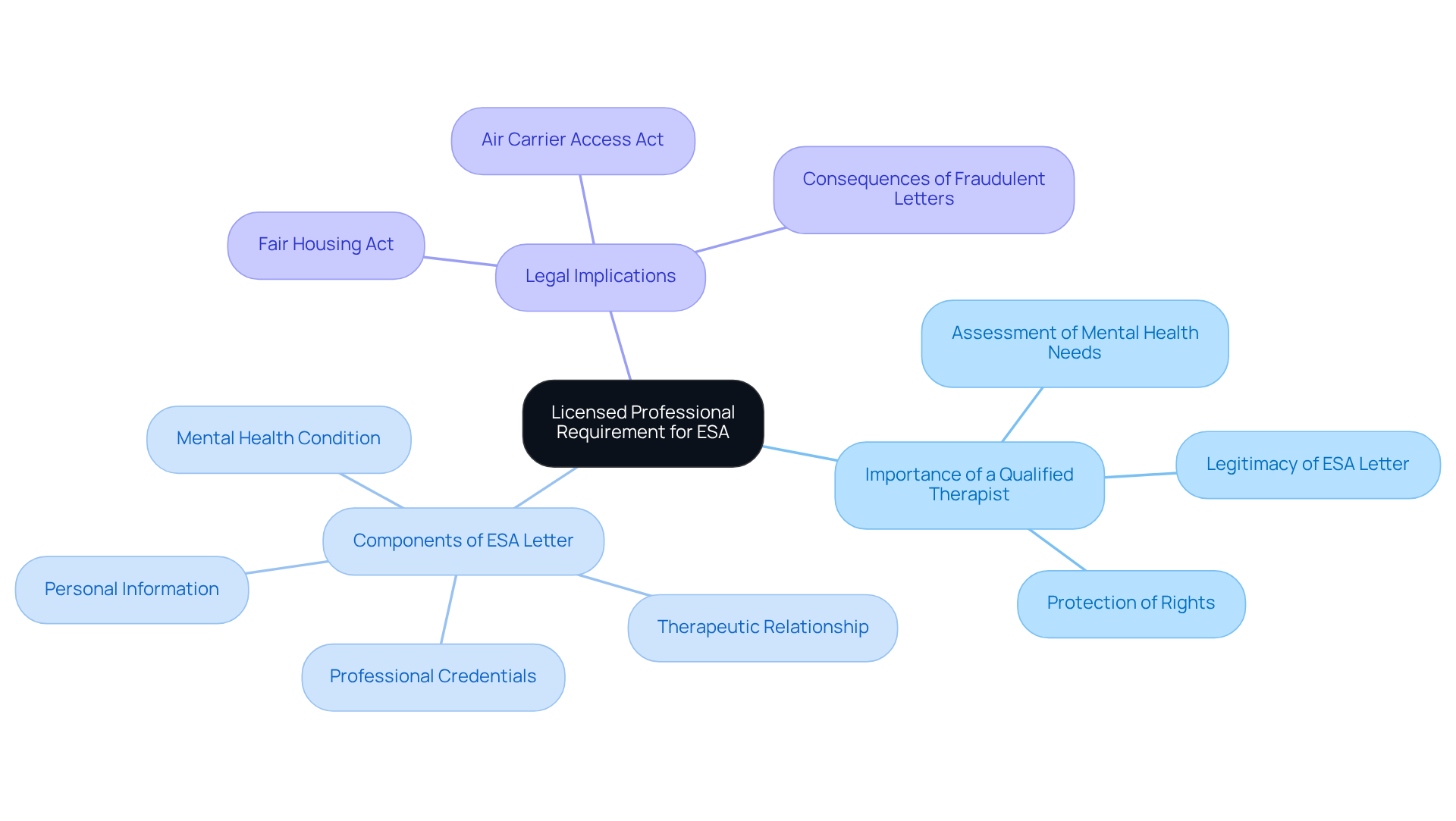
Qualifying Conditions for an ESA: Mental Health Disorders That Justify Support
For many individuals, the journey of seeking an Emotional Support Animal (ESA) stems from the challenges posed by mental health disorders, such as anxiety, depression, PTSD, and specific phobias. It’s heartbreaking to know that approximately 42.5 million adults in the U.S. live with anxiety disorders, which can severely disrupt daily life. In these moments, the companionship of an ESA can be a vital source of emotional stability and comfort.
Research has shown that ESAs can play a significant role in alleviating symptoms associated with these disorders, providing essential support that enhances overall well-being. For example, studies reveal that 3.6% of adults experienced PTSD in the past year, and those with PTSD often find a remarkable reduction in anxiety and depressive symptoms when they have an ESA by their side. This underscores the profound therapeutic benefits that animal companionship can offer.
Moreover, having an ESA can instill a sense of purpose and routine, which is especially beneficial for those navigating the complexities of mental health challenges. As our understanding of mental wellness continues to grow, so does the recognition of ESAs as a legitimate form of assistance, highlighting their crucial role in treatment strategies for individuals facing these debilitating conditions.
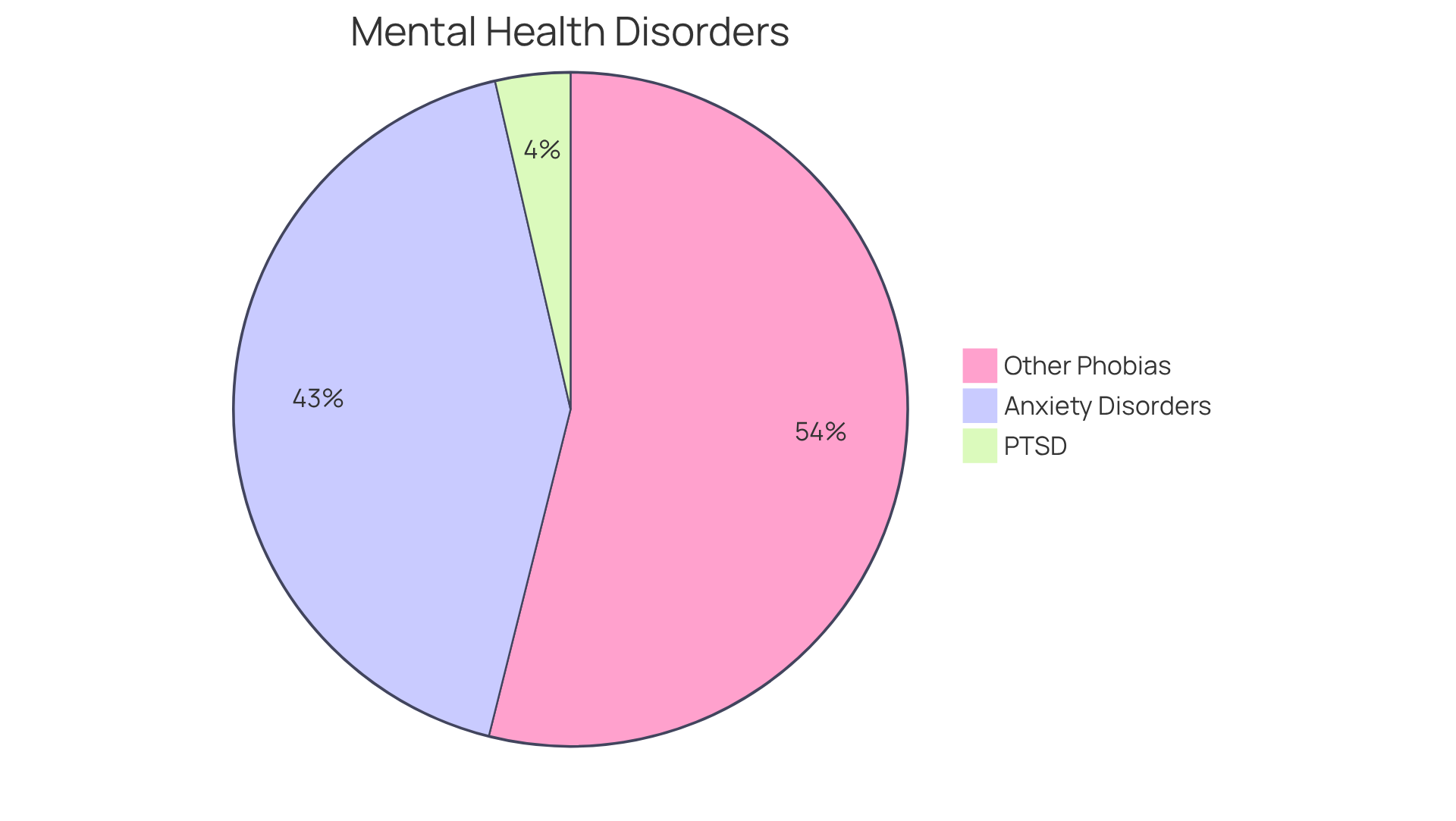
Legal Protections for Emotional Support Dogs: Rights Under the Law
For individuals facing emotional challenges, emotional assistance dogs play a vital role in their well-being. These beloved companions, as outlined in an emotional support dog letter template, are protected under the Fair Housing Act and the Air Carrier Access Act, which allow those with valid ESA documentation to:
- Live with their animals in pet-restricted housing
- Travel with them on airlines
Understanding these rights is crucial for ESA owners, as it empowers them to secure the support they need without the fear of discrimination. Remember, you are not alone in this journey, and there is help available to ensure you and your emotional assistance dog can thrive together.
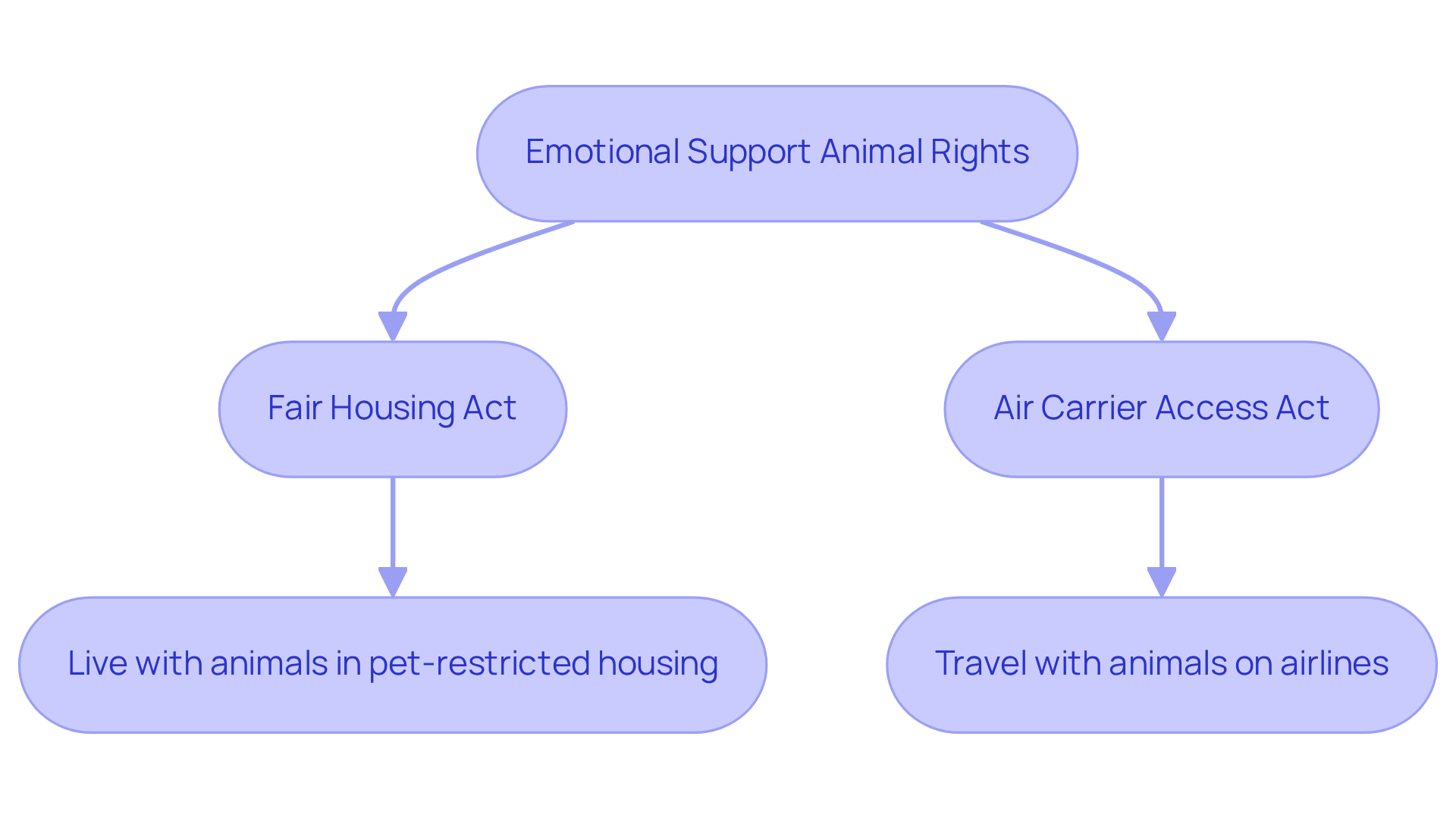
Sample ESA Letter Template: A Practical Example for Guidance
A well-structured emotional support dog letter template is essential for those seeking support from an emotional support animal. It should include the following components:
[Date]
[Client's Name]
[Client's Address]
[City, State, Zip Code]
[Licensed Professional's Name]
[Professional's Title]
[License Number]
[Practice Address]
[City, State, Zip Code]
Dear [Recipient's Name],
I am writing to confirm that [Client's Name] is under my care for [Mental Health Condition]. I suggest a therapy dog to aid in their treatment. This document serves to confirm their need for an ESA under the Fair Housing Act and Air Carrier Access Act, ensuring they have equal access to housing and assistance.
Sincerely,
[Licensed Professional's Signature]
[Contact Information]
Key elements of an effective ESA letter include the date, client and professional details, a clear statement of the mental health condition, and the recommendation for an emotional support animal. The document must be signed by a licensed mental health professional, ensuring it meets legal requirements and supports the client’s rights.
It’s important to recognize that the acceptance of ESA documentation can vary by state, with some jurisdictions enforcing additional requirements to prevent misuse. For example, California mandates a minimum 30-day therapeutic relationship before providing an ESA document. As we approach 2025, staying informed about these regulations is crucial for professionals, as it helps ensure compliance and upholds the integrity of the ESA process.
Mental health experts emphasize the significance of tailoring the message to reflect the client’s unique circumstances, which enhances its credibility. A thorough clinical assessment is vital to determine the suitability of an ESA for the client’s mental health needs. Additionally, potential expenses associated with acquiring an ESA document can range from $49 to $400, depending on the provider, which is an important consideration for clients.
Quotes from mental health professionals highlight the necessity of adhering to legal guidelines when composing ESA documents. A licensed therapist might express, “The key to crafting effective ESA documents lies in our dedication to professional integrity.” By following these guidelines, therapists can effectively assist their clients’ needs while maintaining professional standards.
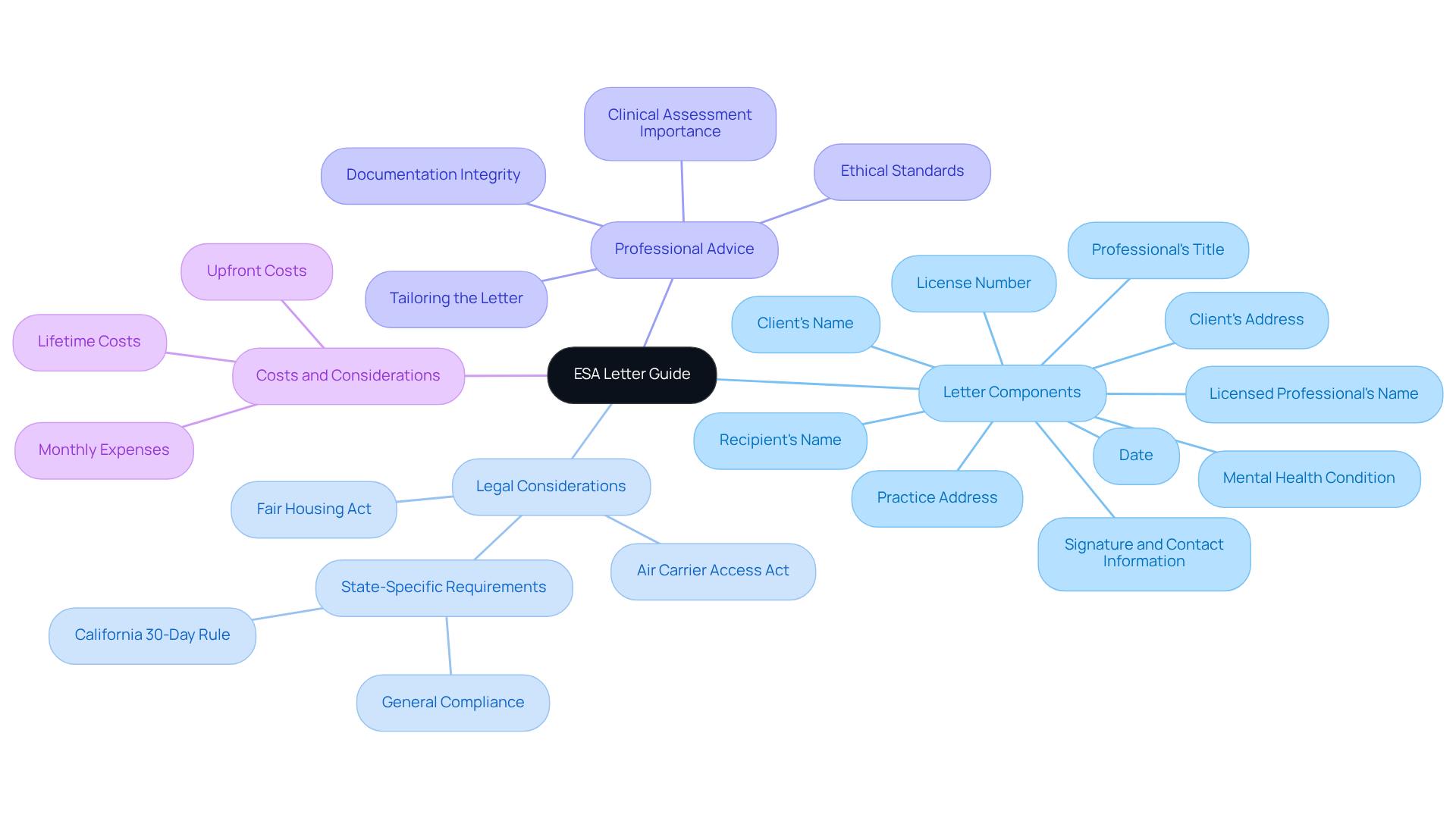
Steps to Obtain an ESA Letter: From Assessment to Approval
To obtain an ESA letter, please consider these essential steps that can help you on your journey:
-
Complete an Initial Assessment: Start by assessing your eligibility through a brief evaluation of your mental health needs. This foundational step is crucial in understanding how an Emotional Support Animal can help alleviate symptoms related to your condition, offering you a sense of hope and relief.
-
Schedule a Consultation: Arrange a meeting with a licensed mental health professional (LMHP) who specializes in therapy animals. This consultation provides a safe space to discuss your specific mental health challenges and explore how a comfort dog can support you during difficult times.
-
Discuss Your Requirements: During the consultation, take the opportunity to openly express your mental health needs and the therapeutic benefits you envision from having a companion dog. This important dialogue allows the LMHP to fully grasp your situation and recognize the significant role that an ESA can play in your life.
-
Obtain Your ESA Document: If approved, you can typically expect to receive your ESA document within 24 hours. However, be mindful that the process of obtaining an emotional support dog letter may take longer depending on your approach and local regulations. This timely response is vital for those needing immediate assistance, ensuring you can live with your companion animal in university accommodation by providing an emotional support dog letter.
-
Advocate for Your Rights: With your ESA document in hand, you can advocate for your rights in housing and travel situations. This document empowers you to ensure adherence to the Fair Housing Act, allowing you to reside with your assistance animal without facing ‘no pets’ rules or additional charges.
Statistics reveal that many individuals successfully acquire an emotional support dog letter, with numerous reports indicating improved mental health outcomes. A recent survey found that 84% of pet owners believe their pets positively influence their mental health, highlighting the essential role of emotional support animals in therapeutic settings. Mental health experts emphasize the importance of a thorough consultation to facilitate a smooth and effective ESA documentation acquisition process. Please be cautious of frauds related to ESA documentation, as several unscrupulous companies claim to provide authentic records without adequate consultation. Having proper documentation, including mental health evaluations and medical history, can significantly expedite the ESA documentation process.
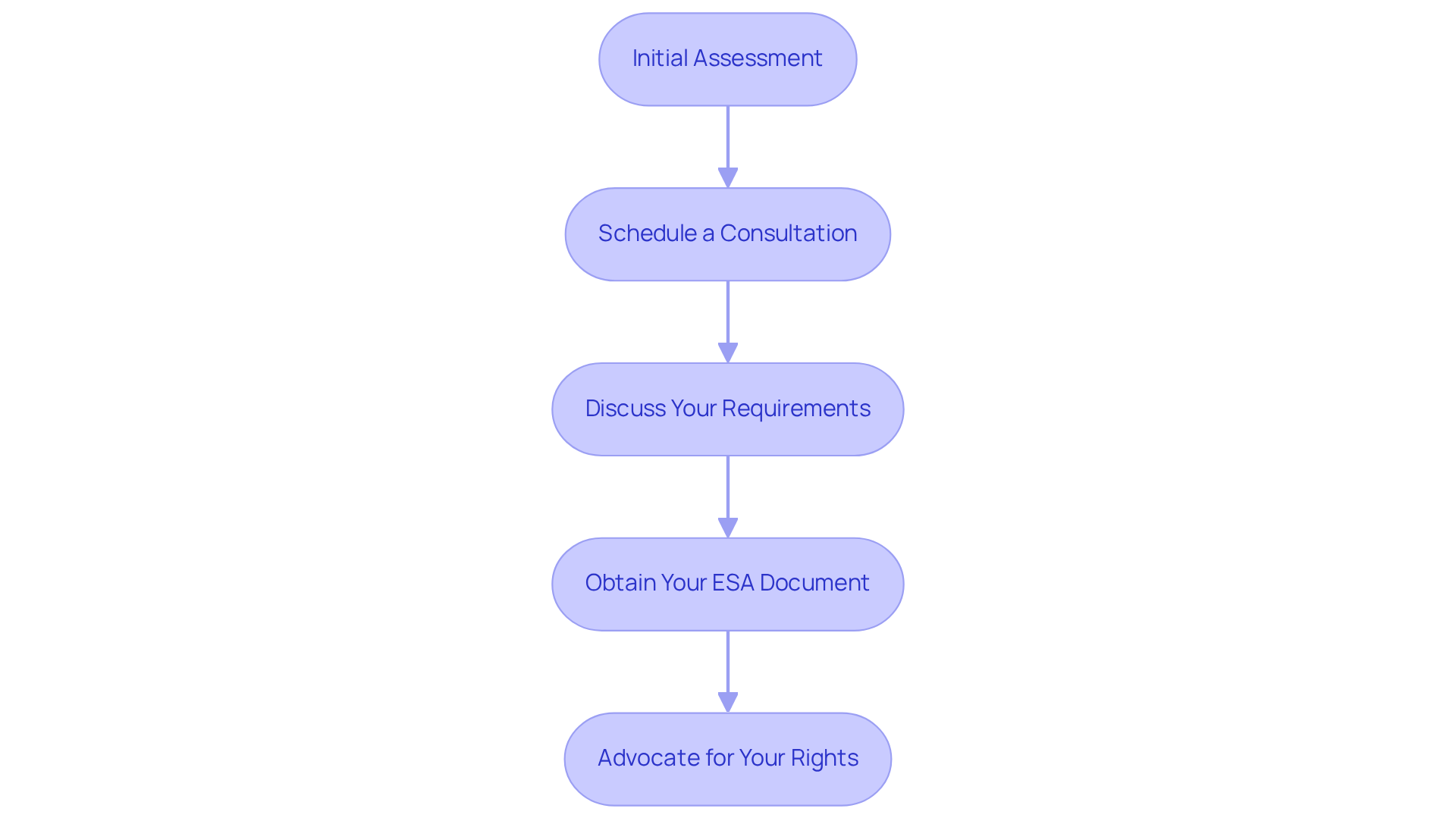
Common Misconceptions About ESA Letters: Debunking Myths
Many individuals face frequent misunderstandings about Emotional Support Animal (ESA) documents, often believing that any pet can qualify or that these animals require extensive training. This can be disheartening, especially for those grappling with mental health challenges. In truth, ESAs are recognized for their therapeutic benefits and can include a variety of domesticated animals, like rabbits and birds, provided they offer emotional support.
Unlike service animals, which are trained for specific tasks and have legal rights to access public spaces under the ADA, ESAs do not require specialized training. However, it is essential for them to be prescribed by a licensed mental health professional (LMHP) who assesses the individual’s mental health condition. This professional must provide an emotional support dog letter template on official stationery, clearly stating the necessity of the animal’s presence in the individual’s life.
Understanding these details is vital for anyone considering an emotional support dog letter template, as it helps clarify the legal protections under the Fair Housing Act. This law allows individuals with valid ESA documentation to live with their support animals in no-pet housing, free from discrimination.
It’s also important to recognize that many housing providers routinely verify ESA letters, underscoring the need for accurate documentation. By dispelling these myths, individuals can navigate the process of obtaining an ESA more effectively and advocate for their rights with confidence. Remember, you are not alone in this journey; support is available to help you through these challenges.
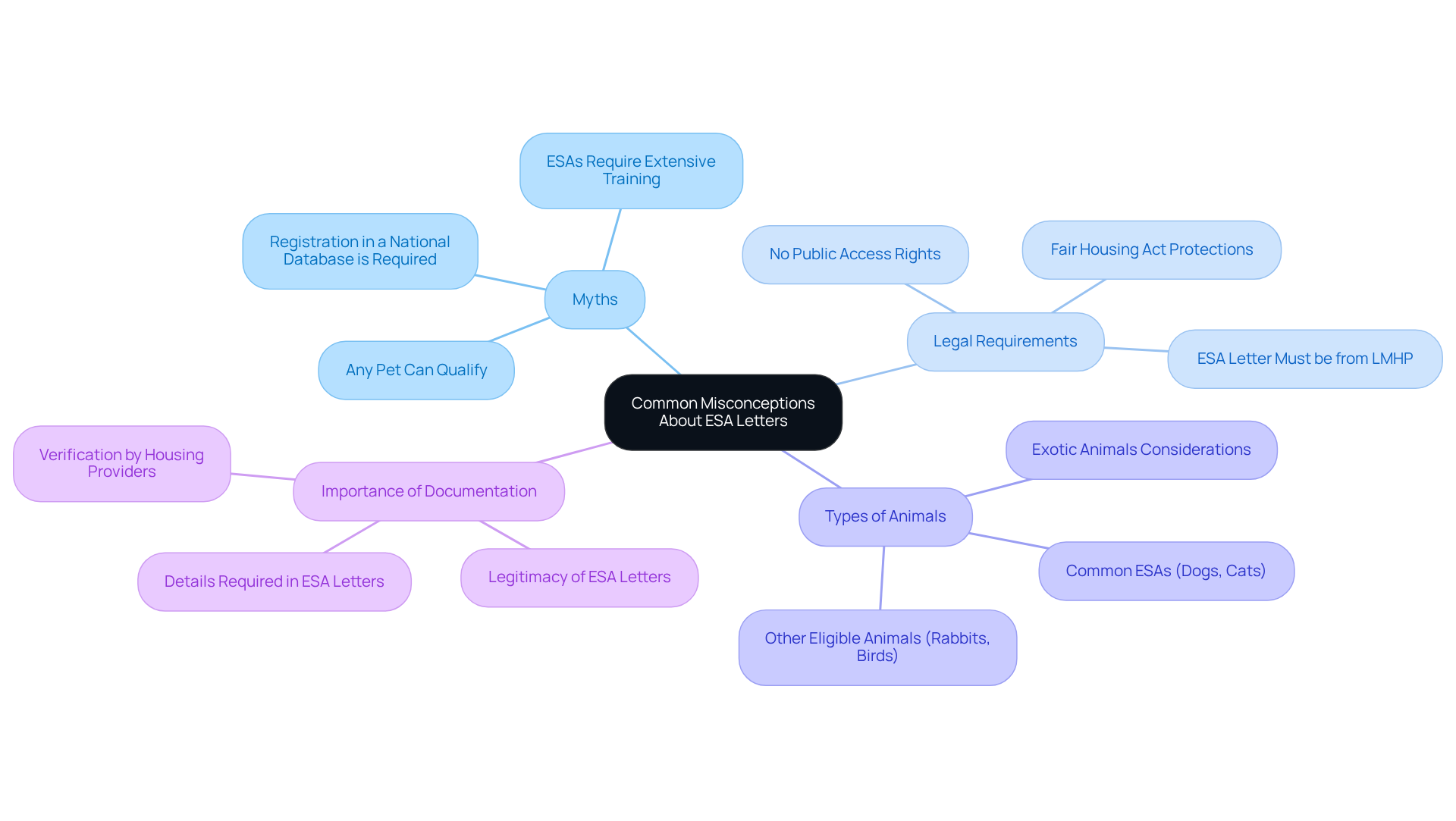
Benefits of an Emotional Support Dog: Enhancing Mental Well-Being
Emotional assistance dogs provide numerous benefits that significantly enhance mental well-being. Many individuals facing emotional challenges experience anxiety, mood fluctuations, and feelings of isolation. Research shows that the presence of these animals can lead to reduced anxiety, improved mood, and a greater sense of safety and companionship. For instance, individuals with therapeutic animals report a remarkable 62% enhancement in their mental well-being during difficult times, compared to only 19% of those without such support. This underscores the vital role that ESAs play in helping individuals navigate psychological challenges.
The unconditional love and support offered by these animals can be transformative, empowering individuals to cope with stressors more effectively. Mental health professionals recognize the profound impact of therapy dogs, with many noting that these animals contribute significantly to recovery and psychological stability. Dr. Boris Levinson, a pioneer in animal-assisted therapy, observed that therapy animals greatly enrich the experiences of their human companions.
Real-world experiences further illustrate this bond, as many ESA owners rate their pets’ effectiveness in enhancing mental health as eight or higher on a scale of ten. This high level of satisfaction highlights the essential role therapy dogs play in the healing journey, offering not just companionship but also a sense of purpose and belonging. As the connection between humans and their emotional support animals deepens, the benefits to mental health become increasingly apparent, affirming the importance of ESAs in fostering emotional well-being.
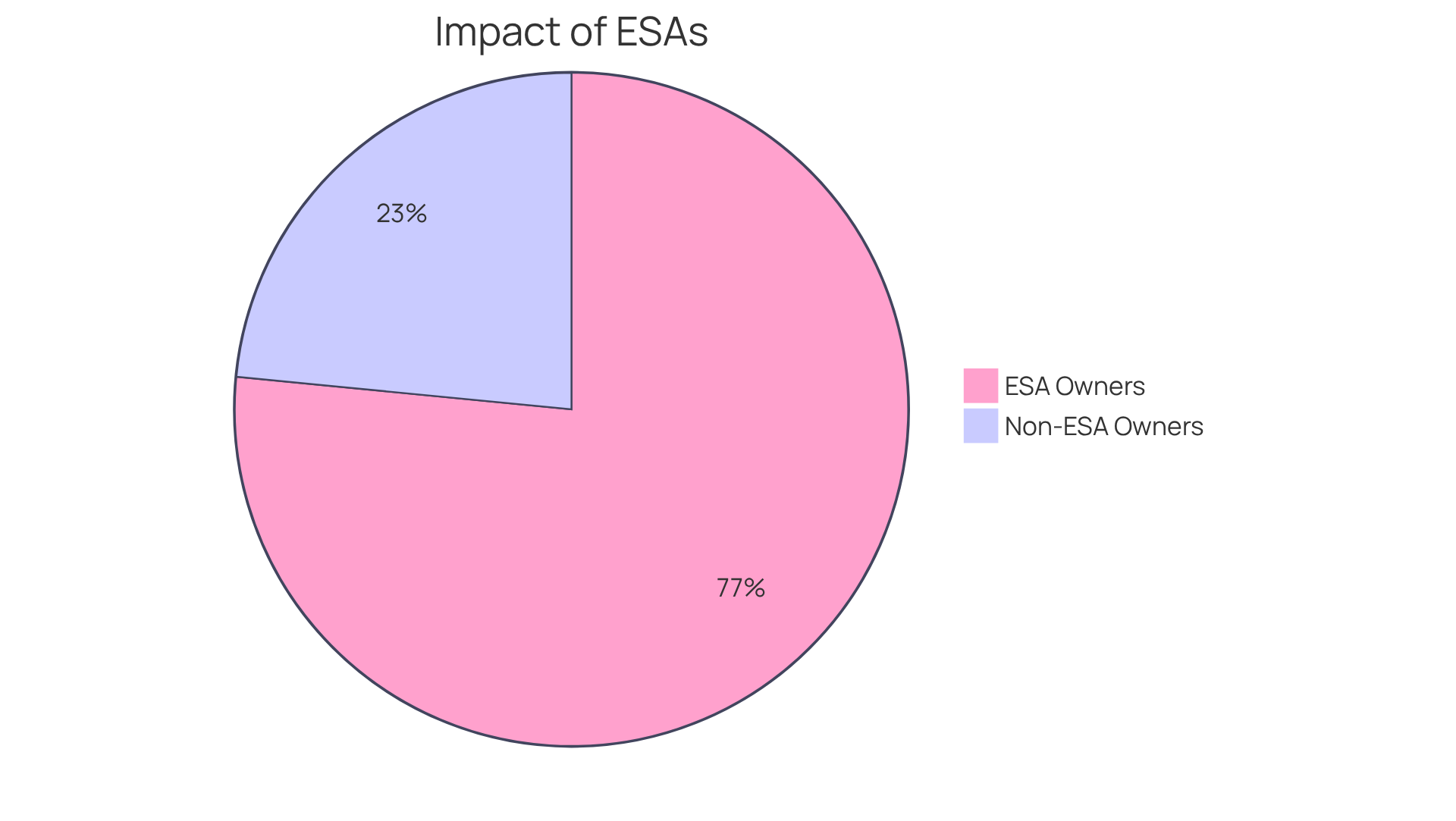
Conclusion
Emotional support dogs play a crucial role as companions for those grappling with mental health challenges, offering comfort and stability during trying times. The importance of securing a well-structured emotional support dog letter cannot be overstated; it ensures legal recognition and access to vital support services. By grasping the essential elements needed in an ESA letter and the legal protections these animals provide, individuals can confidently navigate their path towards improved mental well-being.
This article sheds light on several key aspects of emotional support animals, such as:
- The necessary components of an ESA letter
- The value of consulting licensed mental health professionals
- The rights that come with valid ESA documentation
By obtaining an ESA letter, individuals can advocate for their rights in housing and travel, ensuring their emotional support animal can accompany them when needed. Moreover, the therapeutic benefits of ESAs are highlighted, reinforcing their role in enhancing mental health and offering companionship.
Ultimately, the journey towards mental wellness can be significantly supported by the presence of an emotional support animal. As awareness of the benefits of ESAs continues to grow, individuals are encouraged to reflect on how such support could positively influence their lives or the lives of those they care about. By taking the necessary steps to secure an emotional support dog letter, individuals not only affirm their rights but also embrace the love and companionship that these remarkable animals provide.
Frequently Asked Questions
What services does Wellness Wag provide for emotional support dogs?
Wellness Wag specializes in providing emotional support dog letter templates, ensuring clients receive valid paperwork that meets all legal requirements for their emotional support animals.
How does the process of obtaining an ESA letter work at Wellness Wag?
The process begins with a brief evaluation to understand the client’s personal assistance needs, followed by meetings with certified healthcare providers for a thorough assessment of eligibility. After the consultation, clients receive a professionally crafted ESA letter template within 24 hours.
What is the importance of an emotional support dog letter?
An emotional support dog letter is a legal document that allows individuals to live with their emotional support animals in housing that typically restricts pets and facilitates travel arrangements, providing comfort and companionship.
What benefits do emotional support animals (ESAs) offer?
ESAs provide comfort and reassurance, significantly easing symptoms of anxiety, depression, and PTSD. They promote mental well-being, reduce feelings of isolation, and enhance the quality of life for many individuals.
What are the key components of an effective ESA letter?
An effective ESA letter must include the client’s name, licensed professional’s details, a statement of the mental health condition, a recommendation for an emotional support dog, and the professional’s signature and license number.
How long is an ESA letter valid for?
ESA documents are generally valid for one year from the date of issuance, necessitating prompt updates to maintain their validity.
Are there any guarantees offered by Wellness Wag?
Yes, Wellness Wag offers a Money Back Guarantee if the ESA document does not work for any reason, providing peace of mind to clients.
What should individuals know about traveling with emotional support animals?
Emotional support animals are recognized under the Fair Housing Act but are no longer recognized by Air Canada for travel; only psychiatric service dogs are allowed with proper documentation. It’s essential to complete a U.S. DOT form and notify the Medical Assistance Desk 48 hours before the flight.
Certify Your Emotional Support Animal Today

Why You Can Rely on Us?
At Wellness Wag, we believe your pet deserves care rooted in both science and compassion. Each article is carefully researched, written in clear language for pet owners, and then reviewed by qualified professionals to ensure the information is evidence-based, current, and practical for real-life care. Our goal is to help you feel confident in making informed decisions about your pet’s health and well-being.
Reviewed by
Angela Morris, MSW, LCSW
Angela is a licensed clinical social worker with 20 years of experience in patient advocacy and community mental health. She has assisted numerous clients with ESA evaluations and brings a deep understanding of disability accommodations, ensuring that all information is accurate, supportive, and practical.

Written by :
Lena Park
Last Updated :
September 7, 2025












